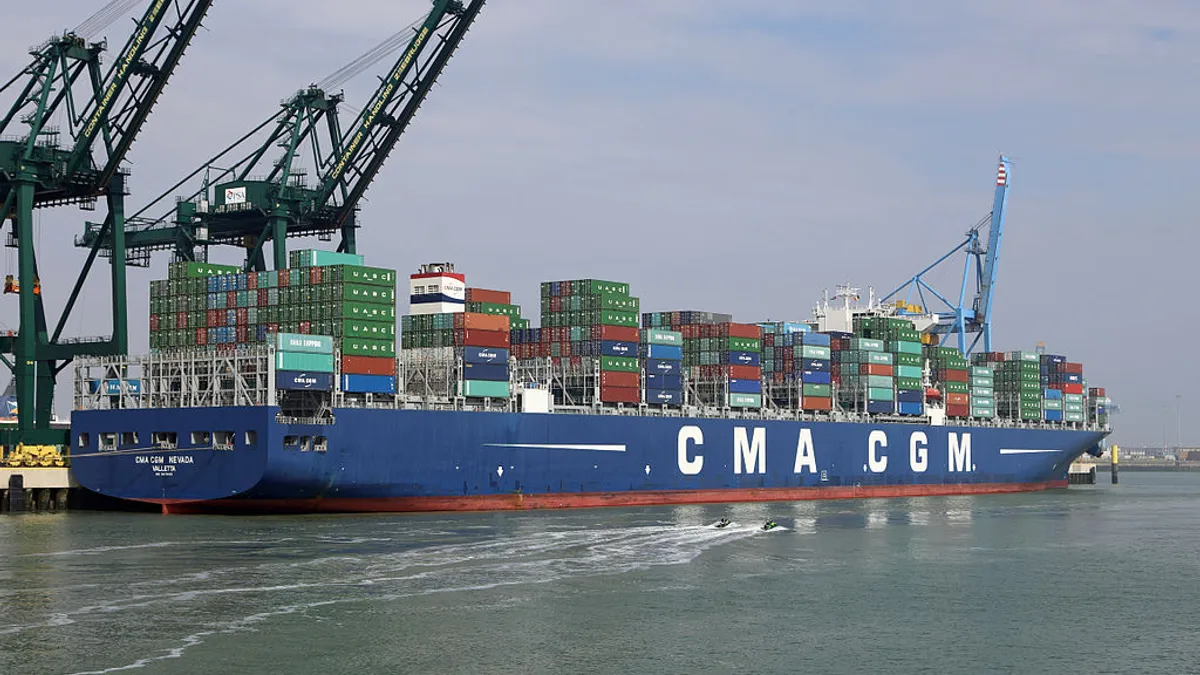Dive Brief:
- CMA CGM told customers Monday its investments to comply with International Maritime Organization (IMO) sulfur regulations — such as using liquefied natural gas (LNG) and installing scrubbers — will cost an average of $160 per TEU.
- "This additional cost will be taken into account through the application or adjustment of fuel surcharges on a trade-by-trade basis," the carrier said.
- Also on Monday, MSC said it will introduce a Global Fuel Surcharge beginning in 2019. "The cost of the various changes we are making to our fleet and its fuel supply is in excess of two billions of dollars (USD) per year," the shipping line said.
Dive Insight:
Ahead of Jan. 1, 2020, carriers are ramping up investments in cleaner fuels and scrubbers to ensure they'll comply with IMO's regulations and contribute to a cleaner shipping industry and supply chain.
The reductions in sulfur emissions will carry long-term benefits for the environment, but the drastic reduction in emissions comes at a cost for shipping lines — and in turn, their customers.
Both Maersk and MSC have estimated costs of around $2 billion annually. While CMA CGM did not give an annual projection on cost increase, it estimates $160 per TEU. With more than 2.6 million TEUs according to data from Alphaliner, CMA CGM could see cost increases of about $423 million.
To offset the costs, Maersk announced a bunker adjustment factor starting in 2019, a year ahead of IMO's regulations taking effect. The surcharges will vary by route and ship, ranging anywhere from $90 to $1,050.
MSC said it will implement a Global Fuel Surcharge beginning the same date as Maersk but did not specify how much. "Operating costs are expected to increase significantly as we continue to prepare for the 2020 low-Sulphur fuel regime," it said.
CMA CGM appears to take a different approach. While the carrier has acknowledged cost increases and a need to somehow absorb those costs, the carrier has not announced specific fuel surcharges or adjustment factors like Maersk and MSC. For CMA CGM customers and routes that may have surcharges, it was unclear when those surcharges would take effect.
Maersk's surcharge announcement drew criticism from shippers and freight forwarders. "Maersk has decided to help itself to a whole year of higher fuel surcharges, a full 12 months before the rules requiring them to use surcharges actually come in," the Global Shippers Forum (GSF) said.
James Hookham, secretary general of GSF, said many shippers prefer to see carriers implement scrubbers, which are a one-time expense, rather than using expensive low-sulfur fuel.
Neither Maersk nor MSC specifically mentioned scrubbers in their surcharge announcements. CMA CGM, meanwhile, said it is ordering several scrubbers for its ships.
"Customers will be looking at the options and voting with their wallets," Hookham said.














